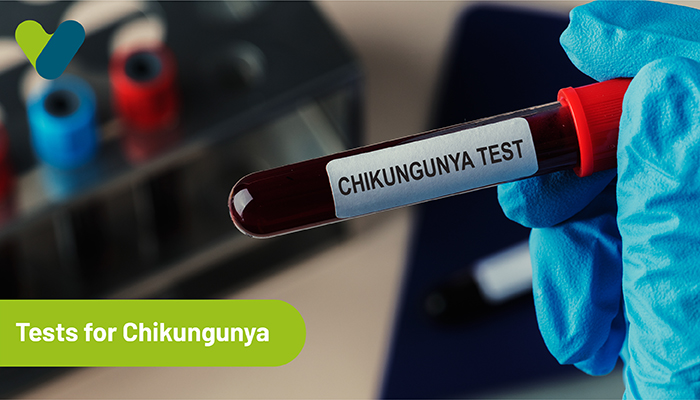Chikungunya blood tests are performed to detect the antibodies produced in response to the chikungunya virus. Chikungunya disease is caused by the bite of a specific mosquito, and its symptoms may be very similar to other mosquito-borne diseases, like dengue fever and Zika. As a result, precise testing is required to administer an appropriate treatment plan.
Dengue, Zika, and chikungunya infections all have similar symptoms. If a doctor suspects chikungunya, they will recommend the following tests:
Serological Examination
A blood sample is taken and examined to determine the presence of anti-chikungunya antibodies IgM and IgG. IgM and IgG tests for chikungunya are most effective when performed within 4–6 days of contracting the infection. These tests are usually inexpensive, but the exact chikungunya test price depends on the location and the lab, and the results can be received within 6 hours of blood sample collection. The enzyme-linked immunosorbent assay (ELISA) test is used to detect IgM and IgG antibodies. The table presented here presents the results interpretation for the tests.- Chikungunya antibodies (IgM and IgG antibodies)
-
- IgM antibodies
-
Reference range
Interpretation
More than 1.10
Chikungunya antibody IgM levels are undetectable.
0.80 – 1.09
Chikungunya IgM antibodies may be present (possible). Testing must be repeated within 10–14 days.
less than 0.79
The detection of chikungunya IgM antibodies is a clear indication of past or current infection.
-
- IgG antibodies
-
Reference range
Interpretation
More than 1.10
Chikungunya antibody IgM levels are undetectable.
0.80 – 1.09
Chikungunya IgM antibodies may be present (possible). Testing must be repeated within 10–14 days.
less than 0.79
The detection of chikungunya IgM antibodies is a clear indication of past or current infection.
This test is useful for detecting the presence of chikungunya virus genes in a patient's blood sample.
Treatment & Preventive Measures of Chikungunya
Chikungunya has no known cure or antiviral treatment. After the diagnosis of chikungunya, the doctor may advise symptomatic medications, such as pain-relieving medicines, to help ease body aches and joint pains. Nevertheless, it is best to take precautions to keep oneself safe.The following are some precautions one can take to avoid the infection and recover faster after chikungunya:
- Because the virus is carried in the patient's bloodstream, it is critical to avoid mosquito bites during the first week of illness.
- After mosquito-borne disease testing, getting enough rest and taking specialist medication at the appropriate times are mandatory.
- Consuming healthy foods aids in the treatment of bodily inflammation and pain.
- Adequate hydration aids in faster recovery by easily removing bodily toxins.
